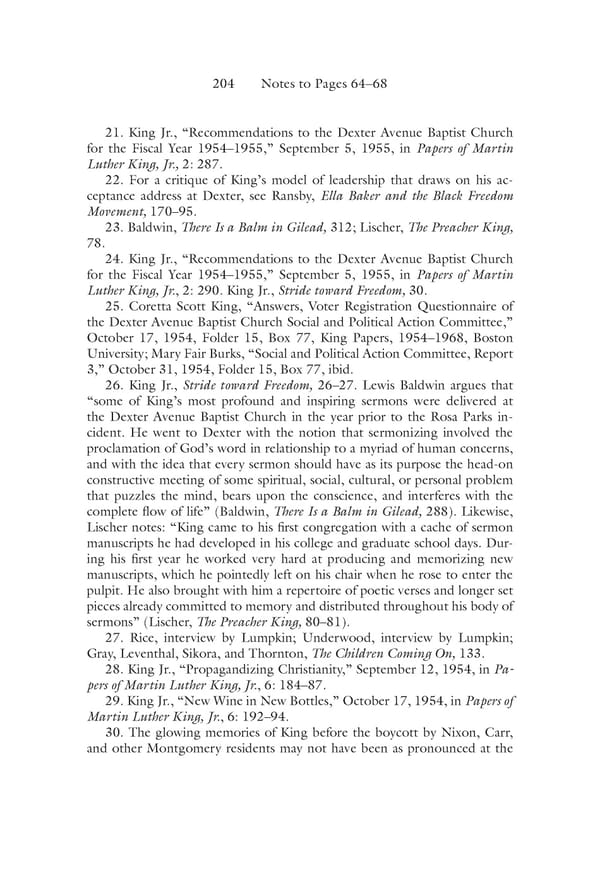204 Notes to Pages 64–68 21. King Jr., “Recommendations to the Dexter Avenue Baptist Church for the Fiscal Year 1954–1955,” September 5, 1955, in Papers of Martin Luther King, Jr., 2: 287. 22. For a critique of King’s model of leadership that draws on his ac- ceptance address at Dexter, see Ransby, Ella Baker and the Black Freedom Movement, 170–95. 23. Baldwin, There Is a Balm in Gilead, 312; Lischer, The Preacher King, 78. 24. King Jr., “Recommendations to the Dexter Avenue Baptist Church for the Fiscal Year 1954–1955,” September 5, 1955, in Papers of Martin Luther King, Jr., 2: 290. King Jr., Stride toward Freedom, 30. 25. Coretta Scott King, “Answers, Voter Registration Questionnaire of the Dexter Avenue Baptist Church Social and Political Action Committee,” October 17, 1954, Folder 15, Box 77, King Papers, 1954–1968, Boston University; Mary Fair Burks, “Social and Political Action Committee, Report 3,” October 31, 1954, Folder 15, Box 77, ibid. 26. King Jr., Stride toward Freedom, 26–27. Lewis Baldwin argues that “some of King’s most profound and inspiring sermons were delivered at the Dexter Avenue Baptist Church in the year prior to the Rosa Parks in- cident. He went to Dexter with the notion that sermonizing involved the proclamation of God’s word in relationship to a myriad of human concerns, and with the idea that every sermon should have as its purpose the head-on constructive meeting of some spiritual, social, cultural, or personal problem that puzzles the mind, bears upon the conscience, and interferes with the complete flow of life” (Baldwin, There Is a Balm in Gilead, 288). Likewise, Lischer notes: “King came to his first congregation with a cache of sermon manuscripts he had developed in his college and graduate school days. Dur- ing his first year he worked very hard at producing and memorizing new manuscripts, which he pointedly left on his chair when he rose to enter the pulpit. He also brought with him a repertoire of poetic verses and longer set pieces already committed to memory and distributed throughout his body of sermons” (Lischer, The Preacher King, 80–81). 27. Rice, interview by Lumpkin; Underwood, interview by Lumpkin; Gray, Leventhal, Sikora, and Thornton, The Children Coming On, 133. 28. King Jr., “Propagandizing Christianity,” September 12, 1954, in Pa- pers of Martin Luther King, Jr., 6: 184–87. 29. King Jr., “New Wine in New Bottles,” October 17, 1954, in Papers of Martin Luther King, Jr., 6: 192–94. 30. The glowing memories of King before the boycott by Nixon, Carr, and other Montgomery residents may not have been as pronounced at the
 Becoming King: Martin Luther King Jr. Page 224 Page 226
Becoming King: Martin Luther King Jr. Page 224 Page 226